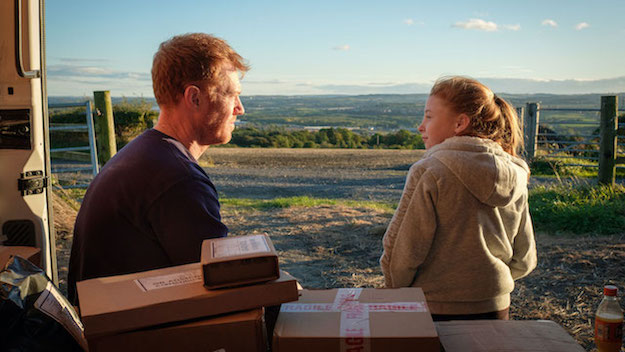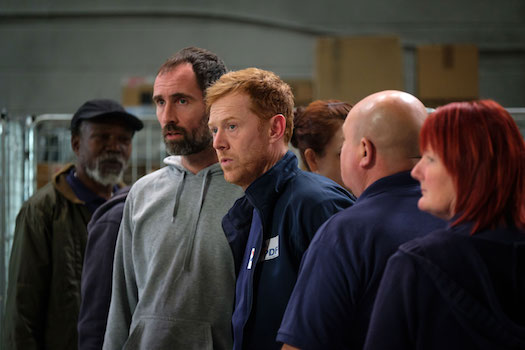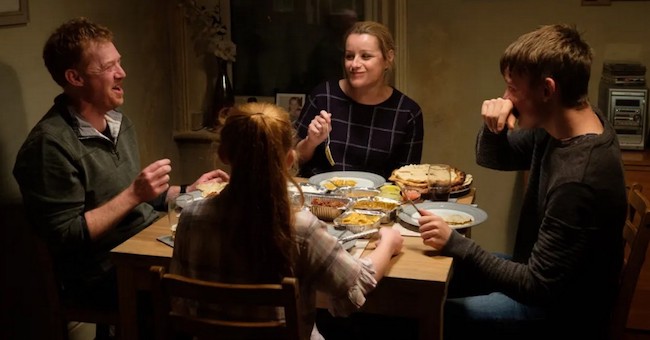| Reviews & Columns |
|
Reviews DVD TV on DVD Blu-ray 4K UHD International DVDs In Theaters Reviews by Studio Video Games Features Collector Series DVDs Easter Egg Database Interviews DVD Talk Radio Feature Articles Columns Anime Talk DVD Savant Horror DVDs The M.O.D. Squad Art House HD Talk Silent DVD
|
DVD Talk Forum |
|
|
| Resources |
|
DVD Price Search Customer Service #'s RCE Info Links |
|
Columns
|
|
|
Sorry We Missed You
The Movie:

NOTE: The images accompanying this article are promo stills that do not reflect the quality of the Blu-ray under review.
Director Ken Loach follows up his Palme d'Or-winning I, Daniel Blake with another shattering look at the way capitalism batters and dehumanizes the working poor. Sorry We Missed You presents a family being ground down by the ascendant "gig economy," and the outlook for them is maybe even bleaker than it was for out-of-work Daniel Blake in the prior film.
In our first glimpse of him, our protagonist Ricky (Kris Hitchens) already looks to be at the end of his rope. Later, we find out that Ricky and his family are victims of the 2008 housing crash, stuck bouncing around between rental homes and short-term jobs ever since. Desperate to regain what he once had, Ricky has been sold on the idea of being "self-employed" as a parcel delivery driver, with the ability to start making a lot of cash if he's just willing to work hard for it. He convinces his wife Abbie (Debbie Honeywood) to sell her car, so he can put a down payment on a delivery van.
All too predictably, this "franchise" opportunity is not the financial windfall or greater answer that Ricky was hoping for. Facing down hefty fines for every failure and having his every moment quantified by a portable scanner, Ricky works himself ragged to break even -- nevermind rebuilding that nest egg. Abbie is in a similar situation as a caretaker, who is paid to visit elderly or disabled "clients" -- on a strict timetable, with no allowances for travel, and now without her own car. They both are barely home and, when they are, they are tired and agitated. The physical absence and the added stress makes its way down to Ricky and Abbie's kids: teenage Seb (Rhys Stone) gives up on school to go tag buildings with graffiti and younger Liza Jae (Katie Proctor) takes it upon herself to manage her brother and parents' problems until she breaks down and starts wetting the bed.
Loach and his long-time screenwriter Paul Laverty are always upfront with their agenda, showing how companies exploit workers like Ricky and Abbie, and then these companies don't even have the decency to call them "employees." As in I, Daniel Blake, much of the outrage comes from the way that people are dehumanized in the name of profits, from the impersonal corporate-speak ("franchisees," "clients") to results-focused working conditions which punish workers for daring to get injured or even sit still for two minutes. In I, Daniel Blake or in Loach's earlier film Raining Stones, the filmmaker leaves room for the suggestion that humanity will find a way to overcome these adversities; in Sorry We Missed You, viewers are simply left with a feeling of being trapped.
But, as in Loach's best work, the characters are three-dimensional humans and not just mouthpieces for a political point-of-view. The plight of the family is effective because of how compelling these people are. The actors playing the family -- most of whom are making their film debut -- have an unforced believability in their interactions. The warmth and the tensions between them are ingratiatingly organic. Even the hard-assed supervisor of the parcel warehouse (Ross Brewster) is given an honest scene to demonstrate where he's coming from, which makes his unwavering dedication to productivity and profit all the more insidious and sad.
The way of life portrayed in the film is heartbreaking, especially post-COVID-19, because we can plainly see that Ricky and Abbie would be considered "essential workers," whose lives would be made even more fraught by the demand for deliveries and healthcare.
I know it's tough out there. And I, for one, haven't really been in the mood for downbeat movies lately. But Sorry We Missed You is so empathetic -- to its characters and to its audience -- that it feels tremendously necessary at this time.

The Blu-ray
The Video:
This is an extremely strong AVC-encoded 1080p 1.85:1 presentation, thanks in no small part to an extremely high bit rate. Shot on film; there are no noticeable issues with dirt or excessive graininess in the transfer to HD. It looks as good as you would hope a brand-new film would look.
The Audio:
The disc offers both DTS-HD MA 5.1 surround and DTS-HD MA 2.0 stereo mixes. Both are clear and well-supported, with the surround more subtly immersive and the stereo more focused and present. An English subtitles option is also provided.
Special Features:
- As on some of their other commentaries, like I, Daniel Blake and Carla's Song, these two collaborators have an easygoing conversational rapport that covers a range of topics but nonetheless leaves room for scattered gaps of silence.
Final Thoughts:
Sorry We Missed You is a perceptive, engaging, and infuriating look at the current economic situation for far too many families. It's essential viewing. Highly Recommended.

Justin Remer is a frequent wearer of beards. His new album of experimental ambient music, Joyce, is available on Bandcamp, Spotify, Apple, and wherever else fine music is enjoyed. He directed a folk-rock documentary called Making Lovers & Dollars, which is now streaming. He also can found be found online reading short stories and rambling about pop music.
|
| Popular Reviews |
| Sponsored Links |
|
|
| Sponsored Links |
|
|
| Release List | Reviews | Shop | Newsletter | Forum | DVD Giveaways | Blu-Ray | Advertise |
|
Copyright 2024 DVDTalk.com All Rights Reserved. Legal Info, Privacy Policy, Terms of Use,
Manage Preferences,
Your Privacy Choices | |||||||













